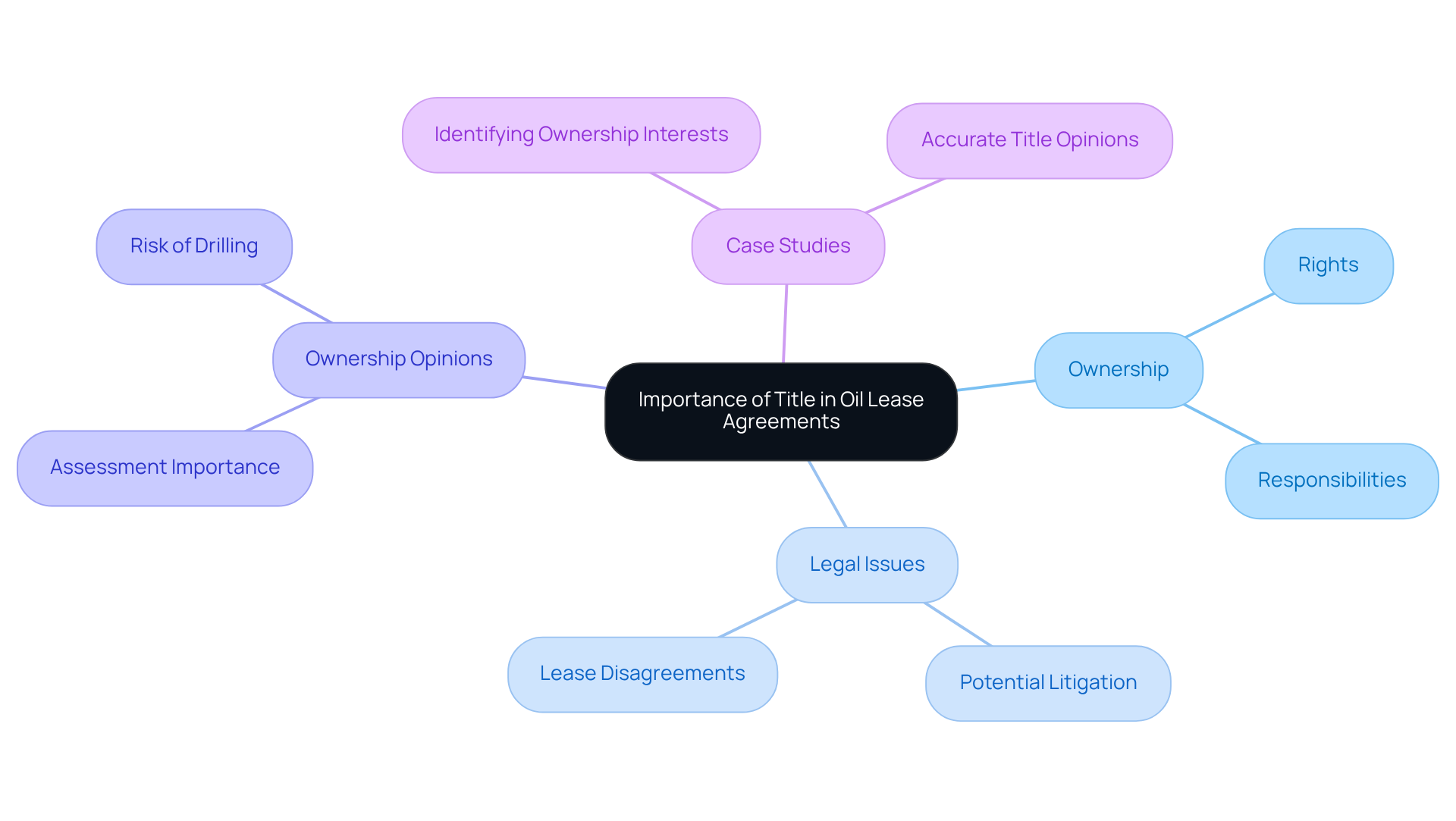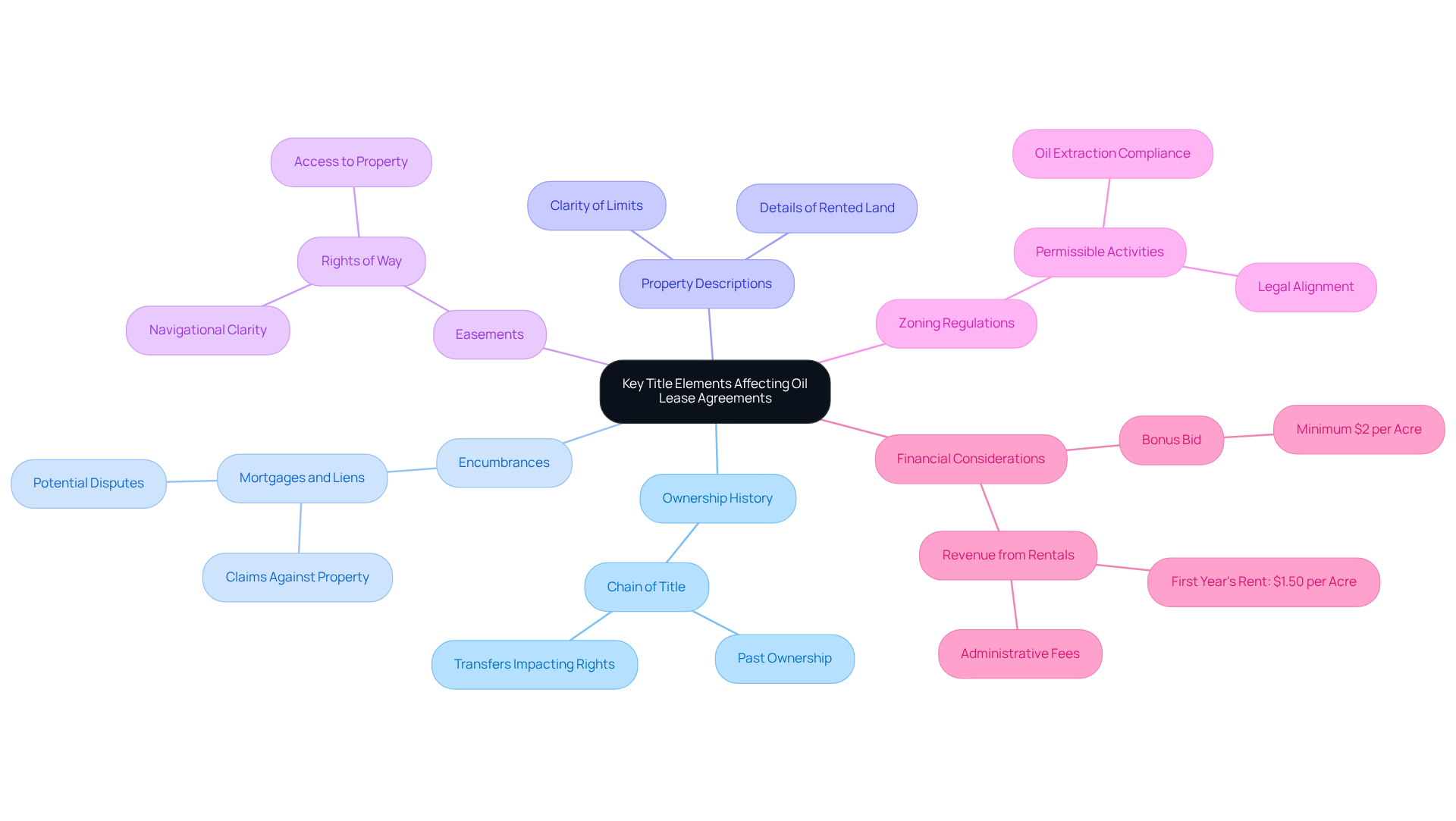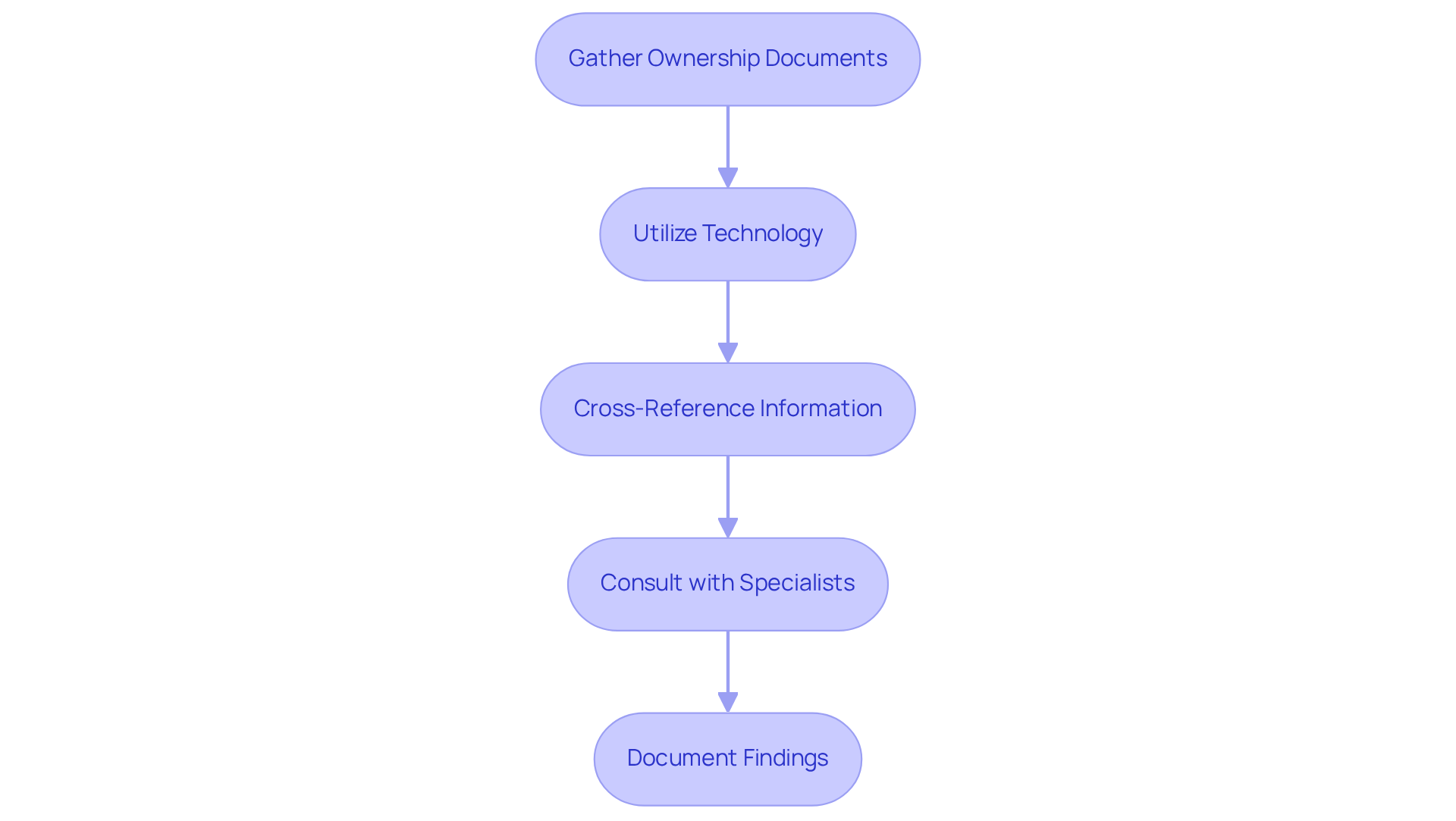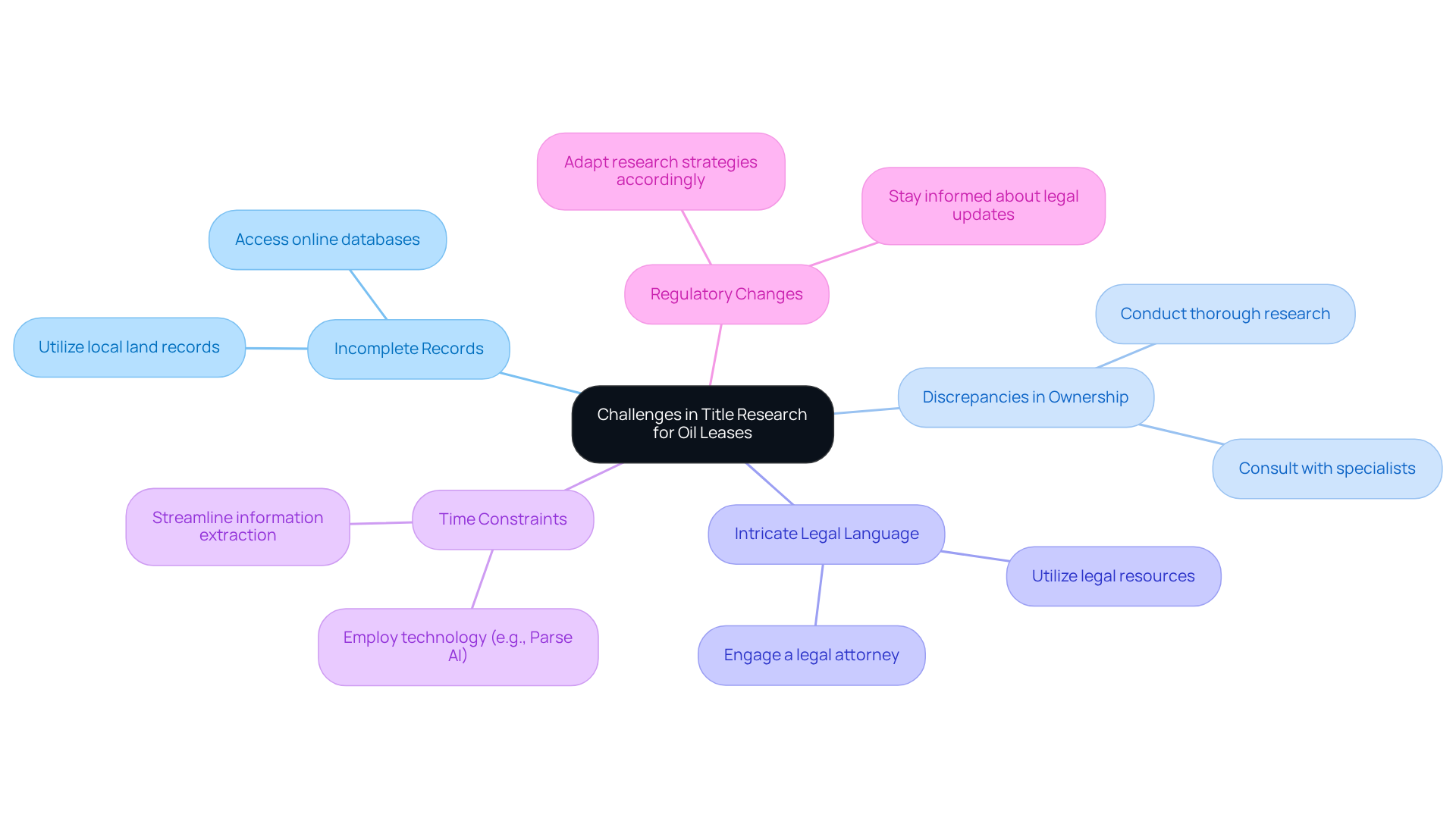Overview
The title "How Title Affects Oil Lease Agreements: Key Steps for Success" underscores the critical role of title in oil lease agreements and outlines essential steps for achieving successful transactions. A clear title is paramount for establishing rightful ownership and mitigating legal disputes.
- Thorough ownership assessments
- A comprehensive understanding of key title elements
These can facilitate more efficient negotiations and ensure compliance within the oil and gas sector.
Introduction
Understanding the intricate relationship between title and oil lease agreements is essential for anyone navigating the complexities of the energy sector. The title not only signifies ownership but also dictates the rights and responsibilities of all parties involved, making it a cornerstone of successful negotiations and operations.
However, the path to securing a clear title is fraught with challenges, from incomplete records to legal ambiguities. Furthermore, how can professionals effectively manage these hurdles to ensure seamless transactions and avoid costly disputes?
Define Title and Its Importance in Oil Lease Agreements
In the context of oil rental contracts, it is important to recognize how title affects oil lease agreements, as it denotes the rightful authority to possess and utilize a property. This concept is vital as it determines who has the power to rent the land for oil extraction. A distinct heading guarantees that the lessee can operate without contractual conflicts. Understanding how title affects oil lease agreements is essential for real estate professionals, as it impacts negotiations, compliance, and overall success. A clearly specified label can prevent expensive legal problems and ensure that all parties are aware of their rights and responsibilities.
Obtaining an ownership opinion before buying or leasing interests is crucial, as it assesses mineral ownership and reveals any potential issues. Without a , energy firms risk drilling on properties where they lack proper rights, resulting in potential litigation, lease disagreements, and financial losses.
Case studies demonstrate the significance of precise opinion assessments in this context. For example, Wetsel & Lederle, LLP, a frontrunner in the oil and gas sector for more than 40 years, has effectively recognized ownership interests and resolved ownership issues for diverse stakeholders in the energy field. Their thorough review of documents and public records has facilitated successful discussions for leases and royalties, ensuring that energy projects advance smoothly. Furthermore, in regions such as Texas and New Mexico, where property interests are frequently divided among several owners, thorough ownership opinions are essential to prevent conflicts that might delay projects and lead to financial setbacks.
Attorney Roderick Wetsel, board-certified as an expert in oil, gas, and mineral law, emphasizes that a well-prepared oil and gas ownership opinion is essential for protecting assets and ensuring smooth operations. Ultimately, the influence of a transparent heading on oil rental negotiations illustrates how title affects oil lease agreements, acting as the foundation for secure and efficient transactions in the oil and gas sector.

Identify Key Title Elements Affecting Oil Lease Agreements
Understanding how title affects oil lease agreements is crucial for professionals in the field due to the significant influence of key title elements.
- Ownership History: A comprehensive understanding of the chain of title is essential. It reveals past ownership and highlights any transfers that could impact current rights. This historical context is vital for assessing the validity of claims, ensuring that all parties are aware of their entitlements.
- Encumbrances: Encumbrances, such as mortgages or liens, represent claims against the property that can directly affect the lease agreement. Identifying these encumbrances early in the process is crucial to avoid potential disputes and ensure a clear path for leasing.
- Property Descriptions: Precise property descriptions are essential, offering clarity concerning the limits and details of the rented land. This reduces the risk of misunderstandings or disputes.
- Easements: Understanding any existing easements, such as rights of way, is critical as they can influence access to the property. A thorough understanding of these rights guarantees that all parties can navigate the property without complications.
- Zoning Regulations: Local zoning laws significantly determine permissible activities on the land, including oil extraction. Understanding these regulations aids in with legal requirements and operational capabilities.
- Financial Considerations: The bonus bid for oil and gas rentals is no less than $2 per acre, and revenue from rentals includes the first year's rent of $1.50 per acre, a bonus bid, and administrative fees. Comprehending these financial factors is essential for assessing the economic feasibility of rental contracts.
By thoroughly identifying and analyzing these elements, real estate professionals can effectively navigate the complexities of oil rental agreements, especially regarding how title affects oil lease agreements, ensuring compliance and maximizing the potential for successful transactions. Furthermore, Parse AI partners with land service experts to tackle their issues, offering creative solutions that enhance the effectiveness of property research.

Verify and Analyze Title Information for Oil Lease Agreements
To effectively verify and analyze title information for oil lease agreements, it is imperative to adhere to the following steps:
- Gather Ownership Documents: Collect all relevant ownership documents, including deeds, abstracts, and any previous rental agreements.
- Utilize Technology: Employ and optical character recognition software to efficiently extract essential information from these documents. This approach can expedite the verification process, reducing the time required from days to mere minutes. Notably, 90% of professionals in the field have embraced generative AI solutions, underscoring the significance of technology in this process.
- Cross-Reference Information: Rigorously compare the extracted data against public records to ensure accuracy. Discrepancies in ownership, encumbrances, and descriptions warrant close attention, as these factors are crucial in understanding how title affects oil lease agreements.
- Consult with Specialists: In cases of discrepancies, seek advice from property researchers or attorneys specializing in oil agreements. Their expertise can clarify complex issues and mitigate potential risks. Collaborating with experienced oil and gas lawyers is especially crucial, as they can offer valuable insights and assist in navigating potential disputes.
- Document Findings: Maintain comprehensive records of your verification process, detailing any issues encountered and their resolutions. This documentation will serve as a valuable reference for future transactions. Additionally, be aware of the responsibilities associated with AI use, such as addressing data bias and ensuring human oversight in the verification process.
By following these steps, you can ensure that the title information is precise and trustworthy, which will minimize risks associated with the lease agreement process and illustrate how title affects oil lease agreements. The incorporation of advanced technology not only improves the efficiency of ownership research but also upholds the legal integrity of oil and gas transactions. Case studies have demonstrated that AI tools greatly enhance the speed and reliability of document examination, further supporting their application in this area.

Address Common Challenges in Title Research for Oil Leases
Common challenges in title research for oil leases encompass several critical issues:
- Incomplete Records: Title documents may be missing or incomplete, complicating the establishment of a clear chain of title. To address this, it is essential to utilize local land records offices and online databases to fill in the gaps effectively.
- Discrepancies in Ownership: Conflicting information regarding property ownership can emerge. Conducting thorough research and consulting with specialists is vital to resolve these discrepancies.
- Intricate Legal Language: Title documents frequently contain complex terminology. Engaging a legal attorney or utilizing is advisable for accurate interpretation of these documents.
- Time Constraints: The research process can be notably time-consuming. Employing technology, such as Parse AI, can significantly accelerate the extraction and analysis of information related to titles.
- Regulatory Changes: Adjustments in local laws or regulations can impact the validity of ownership. Staying informed about any legal updates is crucial for effective research.
By proactively addressing these challenges, real estate professionals can enhance their title research efficiency and comprehend how title affects oil lease agreements.

Conclusion
Understanding the intricate relationship between title and oil lease agreements is paramount for success in the energy sector. Title not only signifies ownership but also delineates the rights and responsibilities of all parties involved. A clear and well-defined title can prevent legal disputes, streamline negotiations, and foster a more efficient leasing process, ultimately contributing to the success of oil extraction projects.
Throughout the article, key elements affecting title in oil lease agreements have been identified, including:
- Ownership history
- Encumbrances
- Property descriptions
- Easements
- Zoning regulations
- Financial considerations
Each of these factors plays a critical role in ensuring that all parties are informed and that potential conflicts are minimized. Furthermore, effective verification and analysis of title information, supported by technology and expert consultation, can significantly enhance the reliability of lease agreements and protect stakeholders' interests.
In light of these insights, it is essential for real estate professionals and energy firms to prioritize thorough title research and verification processes. By doing so, they can navigate the complexities of oil lease agreements more effectively and safeguard their investments. Embracing advanced tools and seeking expert guidance will not only streamline operations but also contribute to the overall integrity and success of oil and gas transactions.
Frequently Asked Questions
What is the significance of title in oil lease agreements?
Title is crucial in oil lease agreements as it denotes the rightful authority to possess and utilize a property, determining who can rent land for oil extraction and preventing contractual conflicts.
Why is it important to obtain an ownership opinion before leasing interests?
Obtaining an ownership opinion is essential to assess mineral ownership and identify potential issues, thereby avoiding litigation, lease disagreements, and financial losses that could arise from drilling on properties without proper rights.
How can a well-prepared ownership opinion benefit energy firms?
A well-prepared ownership opinion can protect assets, ensure smooth operations, and facilitate successful negotiations for leases and royalties, ultimately advancing energy projects without conflicts.
What role do case studies play in understanding the importance of title in oil lease agreements?
Case studies, such as those conducted by Wetsel & Lederle, LLP, illustrate how thorough ownership assessments can resolve ownership issues and ensure successful discussions for leases and royalties in the energy sector.
Why are ownership opinions particularly important in states like Texas and New Mexico?
In Texas and New Mexico, property interests are often divided among several owners, making thorough ownership opinions essential to prevent conflicts that could delay projects and lead to financial setbacks.
Who is Roderick Wetsel and what does he emphasize about ownership opinions?
Roderick Wetsel is an attorney board-certified in oil, gas, and mineral law, and he emphasizes that a well-prepared ownership opinion is vital for protecting assets and ensuring smooth operations in the oil and gas industry.




